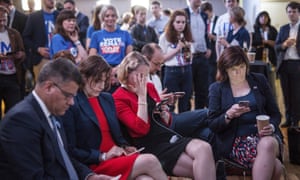Susie Orbach: in therapy, everyone wants to talk about Brexit

We are a week in, and every therapy session has started with Brexit. They’ve stayed with it, too. The shock, the fear, the dismay, the feelings of shame, of being unsafe, of being misplaced and unwanted. Notions of what the UK has stood for in people’s consciousness are being shredded. The vote experienced as an assault on senses of self, of identity and community that people didn’t know they carried inside of them and relied upon until the vote shattered it.
People express anger and despair. The image of where they lived, and what the country has meant to them, is pushing them to consider what kind of fantasy they (and, of course, many of us) have lived with until it came crashing down a week ago. Were they delusional, some ask, to not see the level of alienation and despair that has gripped so much of the country? Were they living in a fairytale in which despite the woes of the last years, it all works out in the end? Were they themselves complicit in a make-believe in which politicians can kick the EU and then expect people to support it? Has Britain become the kind of family in which one side is not talking to the other? There is too, a dirtiness, a sense of having cleaved to an alliance with people they didn’t necessarily like while disdaining the political rhetoric of the other side. Yes, these are Remainers, for the most part. But lest you wonder, my practice is metropolitan, cosmopolitan, London-based, but it isn’t essentially middle-class or Guardian-reading.

The alienations and sorrows that drove people to therapy in the first place are writ large in Brexit. Questions of insecurity and belonging are uppermost; do I have a place, do we have a place, how unbearable that others don’t feel they have a place. These sentiments from the consulting room include a concern for self, rage and worry, mixed with concern for those on the other side. For some, the same psychological factors that led them to disown or split off unwelcome parts of themselves, or to repress them or project them on to others, rebound in Brexit darkness. A few have said: there are parts of myself that I don’t want to know about, and there are parts of my country (or the country) I live in that are showing me a darkness I would rather suppress.
In this sense, Brexit, with its foreboding of irreversibility (although who knows on that one), has brought people into a confrontation with self, with helplessness. For some, there has been the expression of a desire to act, to be counted in a more profound way. Equally, there is fright and consternation about a racism now given oxygen. The barely visible, the shadow, is being seen and it is unwelcome. It has released a shockwave as people recognise that the political really is the personal, and that what is personal – what counts as a response to alienation in some of the Brexiters – is the ugliness of othering the foreign, the newly arrived, the people who are displaced from home. The starkness of this recognition, in the taunts and daubings and attacks that show a fear of the other, are sobering and scary. It hurts to know how powerful and how close to the surface such feelings are, and it is crucial that we contest the underlying terms of a political debate in which racism is acceptable expression of powerlessness. By contrast, it has shocked people to see the nakedness of political power, the House of Cards moves played out in plain view as though politics were a game, even a playpen, with leadership, stewardship and inclusivity barely on the table.
It’s refreshing, then, that the consulting room gives space for complexity, so that there is the expression of fury, yes, but also a perhaps surprising amount of compassion and consideration for those who voted to leave.
The question of living with what is a new reality is not straightforward. Mourning what one didn’t realise one quite had, or even knowing that one did, involves a process of forgetting and then remembering. We go in and out of being highly aware, then getting on with just being busy and becoming startled again when the thought comes back to bite us. It is part of the course of absorbing something deeply unwanted. We go into denial, unknowingly reconstruct the situation to its former state and then experience the punch all over again. This is how mourning goes. We can’t manage it all in one go. It involves shock and shock again as a gradual realignment inside occurs.
But as the week comes to an end and Boris Johnson negates his short-term ambition for perhaps a longer-term one, there is bewilderment and cynicism and a sense of a craziness – like a parent who initiates divorce, creates enormous dissension within the family because he or she badmouths the other parent and then doesn’t take responsibility for causing distress and upset. But Johnson aside – if that’s possible – Britain today is the family divorce writ large. We’re splitting up everywhere.
Splitting is a way of seeming to do something. It feels active. A dumping of rage, of strategising, of taking a stand and looking bold and forceful. But such action is driven as much by uncomfortable feelings as it is by political machinations that were waiting in the wings. Caucusing can feel exciting and important. For some, agony gets temporary relief by attack. It feels as though it is a way of dispelling the problem – but almost inevitably, whether in politics or personal life, it compounds it. Our eyes are drawn to the wrong target, with agony as the driver. That’s not to say action is wrong, of course not, but it needs to follow reflection.
Instability and anxiety are the terms of the day. They are uncomfortable and they need to be lived with long enough for people to think. Alongside them there is an exhilaration. Many are caught up for the first time in ages in the fate of the country. They feel that they’ve awoken, and they want to stay awake. Juggling the need to absorb what has happened and is happening with the capacity to digest one’s feelings and then think politically is no easy feat, but it is happening in countless conversations. The desire for engagement, after the tedium of a referendum campaign which many simply turned off, is stunning.
The question is: can the divisions that exist be addressed in a politically and emotionally literate way? Can we challenge the regressed default of polarisation that only brings greater divisiveness in its wake? Can we, the media, our politicians, the commentators, the trade unionists and activists step up and make sure this diverse family still functions, albeit in a different form? A form that necessarily implies the acceptance of difference, a recognition of the damaging costs of an inequality that must be changed – and meanwhile, an effort to keep our eyes and ears and hearts open to the forms of protest that such deep inequality can engender.